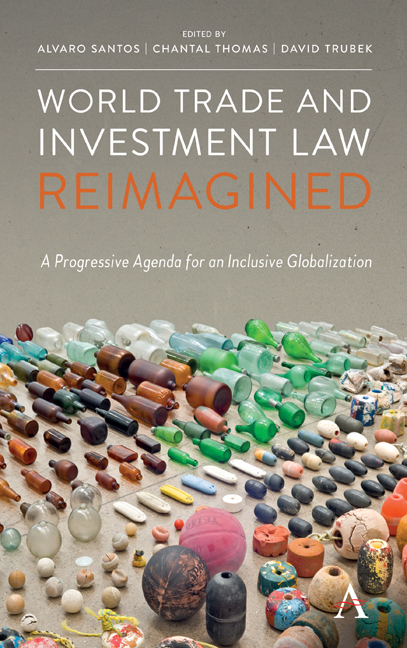Book contents
- Frontmatter
- Contents
- Acknowledgments
- List of Contributors
- Introduction World Trade and Investment Law in a Time of Crisis: Distribution, Development and Social Protection
- PART I RETHINKING THE POLITICAL ECONOMY OF TRADE: COMMENTS ON DANI RODRIK'S STRAIGHT TALK ON TRADE
- Chapter One Comments on Straight Talk on Trade
- Chapter Two Thoughts on Straight Talk on Trade
- Chapter Three Reading Rodrik: A Call for a New Law and Economics for International Law
- Chapter Four Reflecting on Straight Talk on Trade
- Chapter Five A Response to the Comments by Thomas, Gallagher, Shaffer and Santos
- PART II SETTING THE STAGE FOR A PROGRESSIVE VISION: EMERGING ISSUES IN WORLD TRADE AND INVESTMENT LAW
- SECTION 1 MAPPING THE NEW CONTEXT FOR TRADE AND INVESTMENT LAW
- SECTION 2 DEALING WITH MAJOR CHANGES IN THE WORLD ECONOMY
- SECTION 3 FRAMING A MORE EQUITABLE INVESTMENT LAW REGIME
- SECTION 4 SUPPORTING DEVELOPMENT
- SECTION 5 REINFORCING SOCIAL PROTECTION: SPREADING THE BENEFITS OF TRADE, DEALING WITH LOSSES AND EXPLORING THE TRADE–IMMIGRATION NEXUS
- Index
Chapter Four - Reflecting on Straight Talk on Trade
from PART I - RETHINKING THE POLITICAL ECONOMY OF TRADE: COMMENTS ON DANI RODRIK'S STRAIGHT TALK ON TRADE
Published online by Cambridge University Press: 07 September 2019
- Frontmatter
- Contents
- Acknowledgments
- List of Contributors
- Introduction World Trade and Investment Law in a Time of Crisis: Distribution, Development and Social Protection
- PART I RETHINKING THE POLITICAL ECONOMY OF TRADE: COMMENTS ON DANI RODRIK'S STRAIGHT TALK ON TRADE
- Chapter One Comments on Straight Talk on Trade
- Chapter Two Thoughts on Straight Talk on Trade
- Chapter Three Reading Rodrik: A Call for a New Law and Economics for International Law
- Chapter Four Reflecting on Straight Talk on Trade
- Chapter Five A Response to the Comments by Thomas, Gallagher, Shaffer and Santos
- PART II SETTING THE STAGE FOR A PROGRESSIVE VISION: EMERGING ISSUES IN WORLD TRADE AND INVESTMENT LAW
- SECTION 1 MAPPING THE NEW CONTEXT FOR TRADE AND INVESTMENT LAW
- SECTION 2 DEALING WITH MAJOR CHANGES IN THE WORLD ECONOMY
- SECTION 3 FRAMING A MORE EQUITABLE INVESTMENT LAW REGIME
- SECTION 4 SUPPORTING DEVELOPMENT
- SECTION 5 REINFORCING SOCIAL PROTECTION: SPREADING THE BENEFITS OF TRADE, DEALING WITH LOSSES AND EXPLORING THE TRADE–IMMIGRATION NEXUS
- Index
Summary
It has been a treat to read Dani Rodrik's book. I have been an avid reader of his work for a while, and it has been influential in my own thinking, teaching and research. For some time, I have been interested in how critiques of mainstream economics can dialogue with critical legal thinking, and how they might benefit each other. The goal is to explore how economic and legal thought can join forces to imagine alternatives to the existing institutional form globalization has taken. I offer my comments in the spirit of that exploration. A question that motivates this essay is: What insights can we offer from legal scholarship that Rodrik could take on board and put to good use?
Rodrik is an economist, but he might as well have been a lawyer in the way he builds his argument and anticipates counterarguments. I mean that as a compliment. As a bonus, he delivers the punch line with humor and grace. In his book, I recognized several of the many contributions Rodrik has made: his argument for policy space and revitalization of industrial policy, the globalization trilemma, the idea and process of growth diagnostics and the idea of premature deindustrialization and the powerful challenge it presents to developing countries.
I also recognized familiar characters: hyperglobalization, the globalization cheerleaders, the economics professor who speaks with nuance and qualifications when talking about the benefits of trade to graduate students in the classroom but is completely simplistic and even disingenuous when talking to the media. Let's call this character the “two-faced” economist. The book has many valuable ideas, but I want to focus on three themes: (1) the plurality of models, (2) fair trade and (3) the agenda for the nation-state.
A World of Many Models
Reading the chapters “Economists and Their Models” and “The Perils of Economic Consensus,” I thought they could be called “Saving Economics from Economists.” Rodrik takes the two-faced economists to task for contributing to a decrease in the credibility of the discipline and even to the globalization backlash. Arguing for trade liberalization as an unqualified policy program had begun to tarnish the discipline that so unconditionally promoted it in the face of economic malaise and unfulfilled expectations.
- Type
- Chapter
- Information
- World Trade and Investment Law ReimaginedA Progressive Agenda for an Inclusive Globalization, pp. 47 - 58Publisher: Anthem PressPrint publication year: 2019

